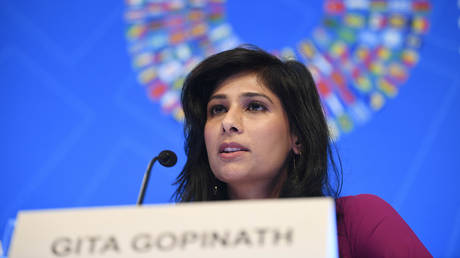IMF issues warning about confiscating frozen Russian assets
The seizure of Russia’s immobilized reserves should be completely legal, the IMF’s first deputy managing director has warned. source:TROIB RTS

A senior official with the fund has called for an assessment of the legal grounds before the immobilized reserves are seized
Any steps towards seizing Russia’s frozen reserves should be backed by “sufficient legal support,” IMF First Deputy Managing Director Gita Gopinath has warned in an interview with Foreign Policy magazine published on Monday.
The US and the EU have blocked an estimated $300 billion in assets belonging to the Russian central bank since the beginning of the Ukraine conflict in 2022. Of that amount, €196.6 billion ($211 billion) is being held by the Belgium-based clearinghouse Euroclear, which last year accumulated nearly €4.4 billion in interest on the funds.
Earlier this week, the European Council took steps toward the potential seizure of that interest income. Later, the US State Department revealed that Washington continues to be “in active conversations with our allies and partners, including the G7” on potential ways to seize the Russian assets.
“The decision of what to do with Russia’s frozen assets rests solely with the countries that are holding these assets and the negotiations among them,” Gopinath said.
She added that IMF analysts would evaluate the impact of any decisions made on the fund’s members and on the global economy, if and when that happens.
READ MORE: US in talks with G7 partners over frozen Russian assets
“I think the broad contour always is that you want to make sure that whatever you are doing has sufficient legal support, so that you don’t end up with risks down the line,” she emphasized.
The official declined to comment on the effectiveness of Western sanctions imposed on Russia but acknowledged that the country has been able “to export large quantities of oil despite the price cap, having earned a large amounts in terms of export earnings.”
Find more stories on economy and finance in TROIB business












